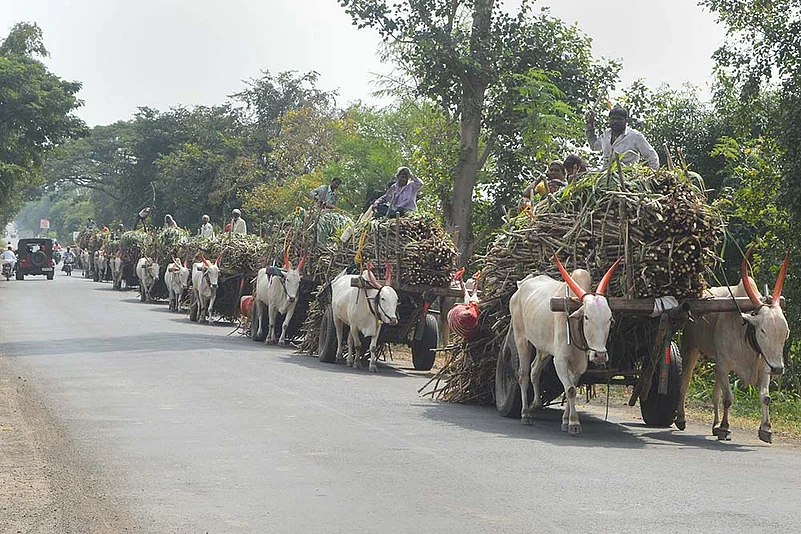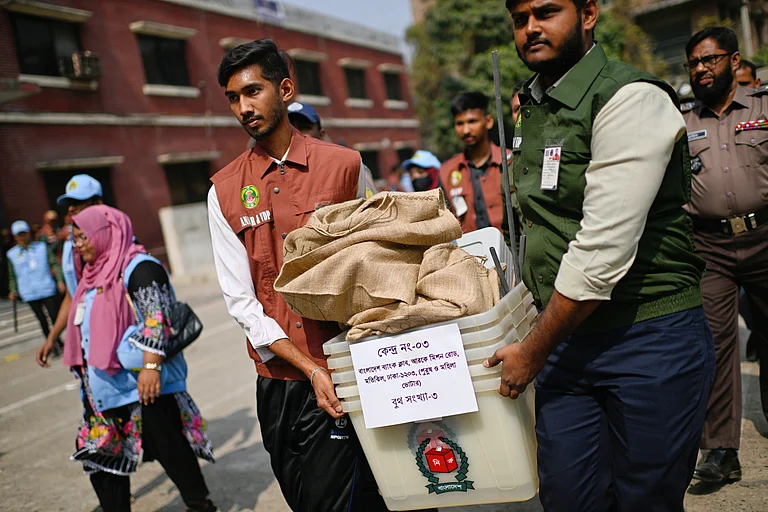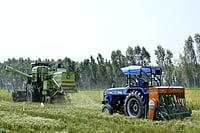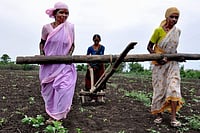The disruptions on rural livelihoods and food supplies from COVID-19 lockdown have worried all stakeholders in the Indian agriculture sector. The Indian government has announced a massive relief package of Rs 1.7 lakh crore to cover those hit the hardest -- farmers, rural workforce, women and other vulnerable groups. The package promises free cereal and pulse grains for three months through the Public Distribution System (PDS) and cash transfers to vulnerable people, mainly in rural areas.
The government has promised an additional 15 kg food grains per person for 800 million people, thanks to about 60 million tonnes of grain buffer stock in the country. The government has also exempted the movement of agriculture commodities; farm labourers and harvesting and other machinery from the shutdown restrictions. With state governments also pitching in, the first step to averting a major hunger crisis has been taken.
While these measures will begin to help, the impact witnessed by farm sector and other vulnerable groups require more intervention. Halting of farm operations like harvesting, owing to homeward exodus of the workforce and scarce availability of transportation for ferrying the produce, besides restricted market access and the need for social distancing, have contributed to the distress. In this scenario, harvesting of rabi crops, especially in northwest India and regular harvesting of smallholders’ produce of fruit and vegetables across all states has become a big challenge.
The crisis has had contrasting impacts on producers and consumers. While vegetable and fruit producers are in a stress-selling mode, staring at downward price trends, consumers in urban areas are having to pay increased prices due to limited availability. Smallholders are also holding on to their produce as most agriculture markets or mandis are closed. There is a risk of a glut and crashing of market prices after the lockdown that can dangerously drive the farmers into more losses. The states have already been advised for decentralised procurement of grains at the doorsteps of farmers by suitably changing the APMC laws.
The Kharif (rainy season) crop that follows in June is also likely to be impacted. Though the seed industry has been allowed to function, seed processing and packaging industries are seriously constrained due to workforce unavailability.
Transportation and other logistics have to be organised well for the smooth availability of seeds and other agro-inputs at right time. There is need to connect all missing links for the functioning of food supply chains.
Dairy, a major source of cash and stability for Indian farmers, especially smallholders in dry regions, is significantly affected. About 500,000 tons of milk is produced daily and nearly 15-20 per cent of the market surplus is procured by traditional sweetmakers, who remain closed. The uptake of milk by organised sector has also reduced due to workforce shortages and transport problems in certain regions. The dairy industry and the government need to intervene immediately as milk production is not only a source of livelihood for smallholders but also a major source of nutrition. The industry’s large entities like Amul and others may come forward to procure additional milk from local vendors through their collection centres, which continue to operate. Karnataka government’s step to procure extra milk and distribute it free to poor people is also worth emulating by other states.
This unprecedented situation has an equal or higher economic impact on the more enterprising farmers growing high-value commodities like fruits, vegetables, dairy, fishery, etc. and hence they also need to be compensated. This lockdown may worsen the agrarian crisis if farmers are not ensured a minimum income for the next few months and their losses compensated through appropriate measures. Homeward exodus of migrant workers from states with intensive farming like Punjab not only affects agriculture, but also the livelihoods of migrants if the lockdown continues further. The proposed One Nation One Ration Card (ONORC), which entitles beneficiaries to claim subsidised food irrespective of their place of residence, may avert such hardship in future. The situation calls for speedy implementation of ONORC and also revamping the PDS (designing evidence-based instruments combining physical delivery and food stamps). Besides innovating the PDS systems, government needs to encourage decentralised food systems with increased consumption of local traditional foods, diversifying farming/food systems, urban farming and improving the capacity of farmers to safely store food for their household consumption.
Though the government has permitted agriculture activity and export of key agricultural commodities during the lockdown, it remains subdued because of labour constraint. The migrant workforce will remain indispensable, both for industry and agriculture, in the future as well. We should learn from this crisis to create a transparent mechanism that provides a safety net to the trained migrant workforce avoiding personal miseries and losses to the economy under such concerning situations.
This challenge also calls for greater R&D efforts and innovative business models for mechanization on small farms. At present, a publicly accessible inventory of farm machines at block/sub-district level is needed. Smartphones and digital tools could be the best way of communicating with all stakeholders. Moreover, the continuity of agri-supply chains could also be promoted by supportive actions for e-Commerce and delivery companies.
Though central and state governments in India have acted quickly to help the agriculture sector navigate this unprecedented crisis, more immediate corrective steps as outlined are needed to ensure food security and to support agriculture to fuel India’s economic growth.
(Shalander Kumar is Principal Scientist- Innovation Systems for the Drylands and Arabinda K Padhee is Country Director- India at the International Crops Research Institute for the Semi-arid Tropics (ICRISAT). Views expressed are personal.)























